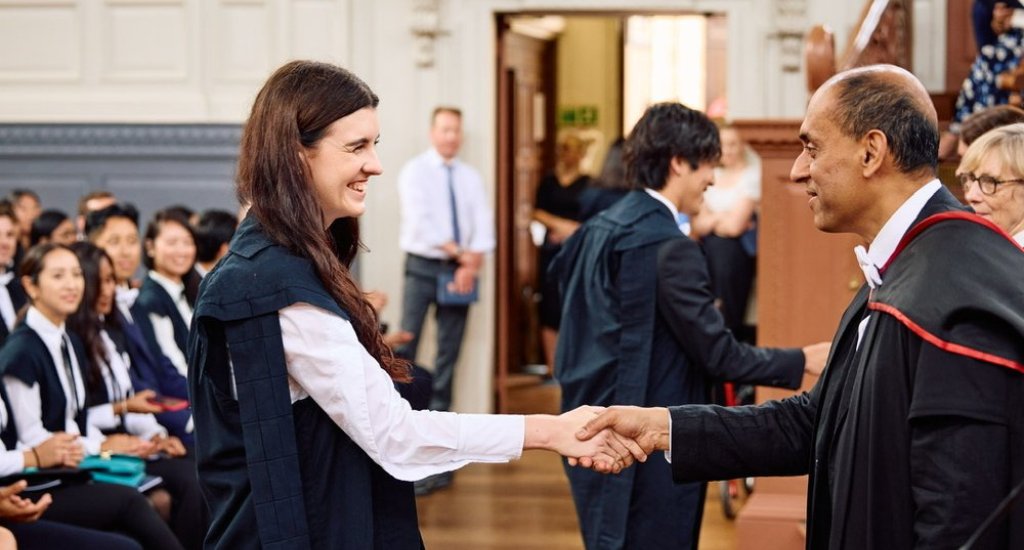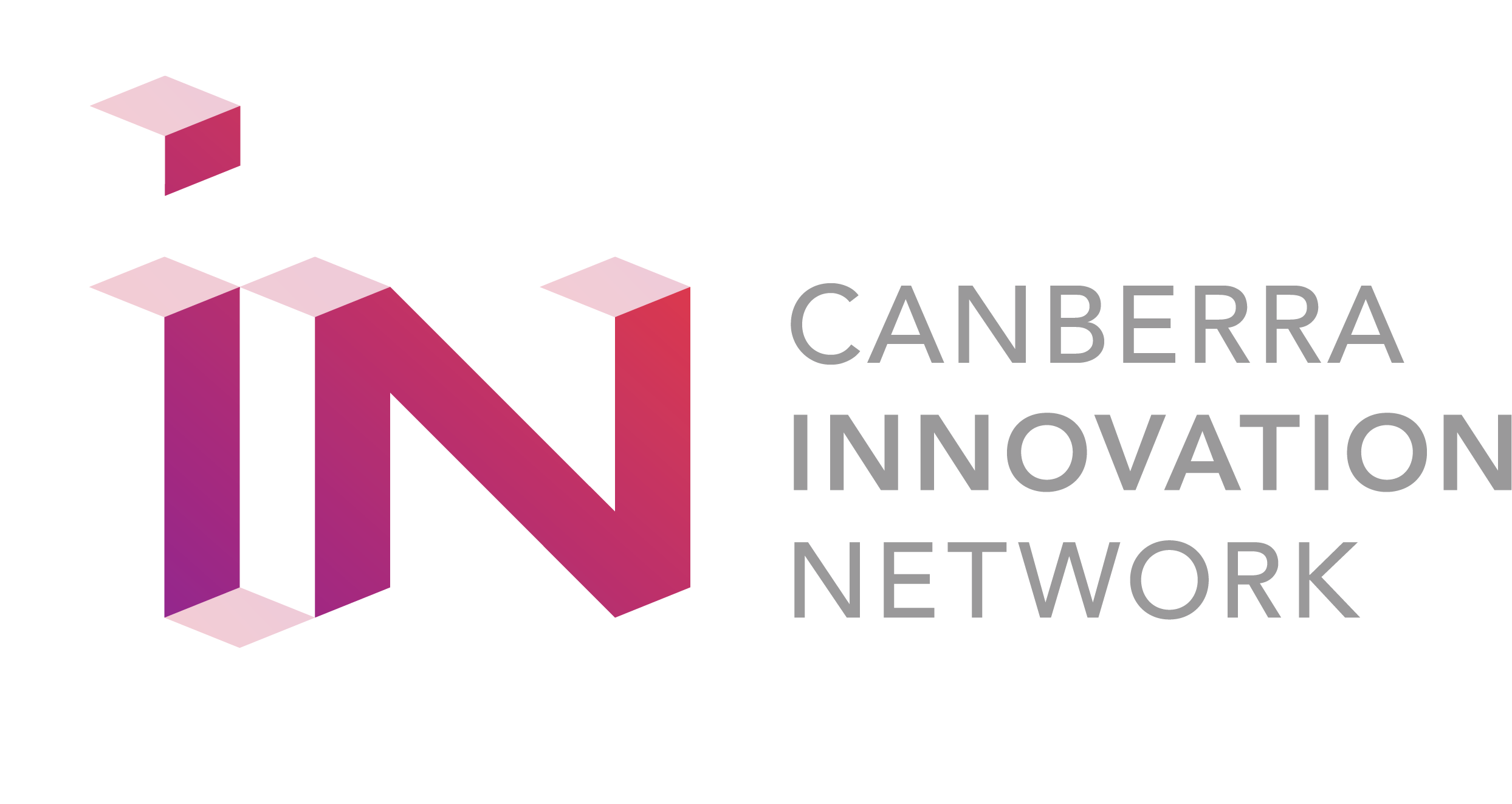- 12 February 2024
- Posted by: Canberra Innovation Network
- Categories: Coworking, Feature, General News, Startup Stories & Profiles, Women in Innovation

Rebecca Keeley is new to Canberra, but already she’s loving the sunshine. She completed a Masters of Business Administration (MBA) at Oxford in September last year. And after graduation chose Canberra as the place to launch her startup.
Oxford days

Keeley studied and trained as a speech pathologist in Australia, working in regional areas throughout the country including as Senior Speech Pathologist and Head of Department at Griffith Base Hospital. She has been a staunch advocate for allied rural health. Then she travelled to the UK to study an MBA at Oxford on a full ride scholarship including the prestigious General Sir John Monash Scholarship, graduating in September 2023.
Keeley said that the Oxford course had a strong focus on social impact, which made it different from a traditional finance-based degree. ‘So it’s about how you use business for good essentially.’
Her original goal was to work with the World Health Organisation on project delivery. ‘I just wanted to work on a global scale for a while rather than national, to see what happens in other places,’ she said.
“I realised if I was going to do it, I should probably do it straight away”
But at the back of her mind was an idea for something that would help with a problem she had frequently seen in her patients. ‘I had this idea I could use my time at Oxford to park it [her idea for Yarn] for a while,’ she said, adding that she felt she needed time studying business to fill the knowledge gap she thought she was lacking.
But then, she realised she couldn’t wait to launch her startup any longer. ‘During COVID, we’d seen the move towards people being comfortable with using technology to treat patients, e.g. telehealth,’ she said. ‘And the idea of what is now Yarn grew a lot quicker than I expected. I realised if I was going to do it, I should probably do it straight away,’ she said.
That led to her and her fiancé moving from the UK back to Australia – and choosing to make their home in Canberra, a city they had never lived in before.
Why Canberra?
Often people relocate to Canberra because of work – whether it is in the Australian Public Service, the military, academia or the diplomatic corp. But Keeley’s choice of Canberra was intentional: she wanted to live somewhere in Australia that was strategically located. The top three choices were Sydney, Melbourne or Canberra. They chose Canberra.
“I’m really excited that I have found a series of women doing startups here”
After moving here, Keeley embarked on developing her startup. And that involved networking at Canberra Innovation Network events. She immediately noticed that more clinicians turned entrepreneurs in Canberra than she had expected – including women.
‘I’m really excited that I have found a series of women doing startups here. I think it’s well-known that there’s not a lot of females in the health tech sector more broadly, and it’s been so wonderful to meet other clinicians here.’
‘Australia, particularly in health and the early intervention space provides a really unique opportunity, and I think I need to do this here, not in the wonders of Oxford for now.’
Yarn
Keeley is the founder of Yarn, a startup developing a gamification platform to make basic speech pathology principles more accessible, especially for children.
“Kids can be mean, and if you don’t sound like all your other little friends, it can be really challenging socially as well”
Keeley recognised a problem in how Australia delivered speech pathology services in her first job out of university, where she noticed the waitlist for speech pathology services was two and a half years. And in the last decade, rather than getting better, it’s only gotten worse. The waitlist in New South Wales is 20 months for an assessment and 24 months for an intervention. ‘So it takes four years from the moment you realise your child has a problem to actually getting some help,’ said Keeley.
The long waitlist is especially problematic in the early intervention space and exacerbates confidence issues with young children and anxiety in their parents. It’s especially hard when children start school before an identified speech issue has been addressed and adds to the social and mental load a child carries.
‘Kids can be mean, and if you don’t sound like all your other little friends, it can be really challenging socially as well,’ she said.
‘We go on and on in Australia bout the importance of early intervention – and yet we can’t do it with speech pathology. We can’t do it early enough because children can’t get an appointment. This leads to a spiralling effect, where a small problem becomes a much bigger one.
Where have all the speech pathologists gone?
The key reason for the long waitlist for speech pathologists is that there are not enough speech pathologists to meet the demand.

Added to the waitlist is the fact that problems are often identified late. According to Keeley, parents rarely identify speech problems in the early years. ‘It’s not that parents aren’t aware of their children. But you understand your child and what they are trying to communicate because you are always with them. And it’s usually only when they start school or childcare or mum’s groups when they are with other children the same age that parents realise their child isn’t quite there.’
In many cases, a speech issue might not be picked up until a child starts preschool at age four. And then, by the time a child gets treatment, they are already well into their schooling, and problems have become a bigger issue as it is affecting their education and socialisation.
The long wait list has unintentionally been exacerbated by the introduction of the National Disability Insurance Scheme (NDIS).
“NDIS is such an incredible thing”
Keeley describes the NDIS as a wonderful program that has changed many people’s lives. However, it led to two things occurring in the speech pathology field. With guaranteed funding for certain clients, many clinicians closed their books to new clients. At the same time, NDIS led to more people being diagnosed as having a disability, with parents becoming open to recognising their children’s challenges because funding was now there to provide support.
‘NDIS is such an incredible thing,’ she said. ‘When it came out, it was like we finally gave people the opportunity to be supported in the way that nowhere else in the world is. I think it’s something that I became more reflective of when I was overseas. But for the workforce, it was a big challenge, and I think we’re still trying to navigate that even ten years after it rolled out.’
Keeley kept seeing and hearing about this problem of the long wait as she moved jobs throughout remote areas of Australia – including parts of the Northern Territory and the Wagga Wagga/Griffith region. As she climbed the health ladder in her career, the problem persisted. ‘And the higher I got, the more I thought it would be easier to make tangible change – and yet the more brick walls I kept hitting. And we just weren’t innovative.’
Digital innovation
Yarn is a digital speech platform aiming to reduce wait times and wait lists for people struggling to access speech services. It will build an AI generated daily task program for parents and children to do at home while they are on the waitlist to try and self-resolve some of the easier issues. Yarn’s first program will be for late talkers. This is important because it impacts many other things, including education.
‘In general, most children have one word by age one. If kids aren’t quite there, that’s okay. But if they reach 18 months and they’re still not getting their first word, it’s probably a bit concerning. And what we find is that if we don’t pick it up, if we leave it, then there’s a big flow on effect to other problems that affects not just communication, but also learning. So, a mild problem that takes a month or two to fix becomes a moderate problem, and then by the time speech pathologists actually get to it, it’s a severe problem, and we’re stuck.’
The Yarn app aims to use gamification to encourage children and their parents to complete three tasks a day. ‘There’s a lot of evidence to say gamification gets kids to engage a lot more, and they don’t realise they’re learning.’ Keeley points to the success of other Australian platforms that use gamification to encourage children’s learning, such as Reading Eggs and Mathletics.
The aim of the app is to develop tasks that speech pathologists would do in a clinical setting and teach parents and kids how to do them at home so they can get moving. ‘We’re not able to replace the clinician,’ said Keeley. Neither can it help all children with many requiring face-to-face appointments, especially for cases that require complex intervention from someone with clinical knowledge and skill. Still, there are a lot of kids on the waitlist who can be helped, and by doing so, it will free up many clinicians.
Keeley is now working on Yarn full-time, but once the app is in the minimum viable product (MVP) stage, she plans to go back into clinical practice to test it with her patients. In the meantime, some local speech pathologists have offered to participate in a pilot program when the MVP is ready. Yarn also hopes to work with the University of Canberra speech program, which has a research focus on digital interventions.
Article written by Serina Bird for the Moore Street Journal.

